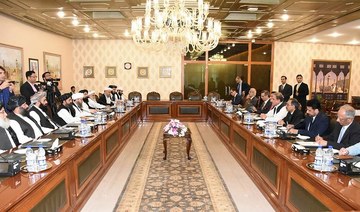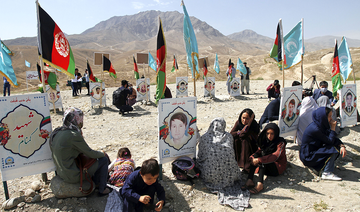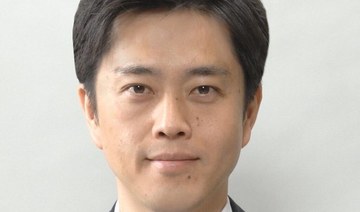KABUL, Afghanistan: The US Embassy in Afghanistan is warning that extremists groups are planning attacks against a “variety of targets” but are taking particular aim at women.
The warning issued late Thursday doesn’t specify the organizations plotting the attacks, but it comes as the Taliban and government-appointed negotiators are sitting together for the first time to try to find a peaceful end to decades of relentless war.
The “Taliban don’t have any plans to carry out any such attacks,” spokesman Zabihullah Mujahed told The Associated Press on Friday.
Peace negotiations underway in Qatar, where the Taliban maintain a political office, are in the initial stages with participants still hammering out what items on the agenda will be negotiated and when.
Washington’s peace envoy Zalmay Khalilzad said at the start of negotiations last weekend that spoilers existed on both sides. He said that some among Afghanistan’s many leaders would be content to continue with the status quo rather than find a peaceful end to the war that might involve power sharing.
According to the embassy warning, “extremist organizations continue to plan attacks against a variety of targets in Afghanistan, including a heightened risk of attacks targeting female government and civilian workers, including teachers, human rights activists, office workers, and government employees.”
The embassy did not provide specifics, including how imminent is the threat.
The Taliban have been harshly criticized for their treatment of women and girls during their five-year rule when the insurgent group denied girls access to school and women to work outside their home. The Taliban rule ended in 2001 when a US-led coalition ousted the hard-line regime for its part in sheltering Al-Qaeda, which was responsible for the 9/11 terrorist attacks on the United States.
One of the government-appointed peace negotiators, Fawzia Koofi, a strong, outspoken proponent of women’s rights, was shot last month in Afghanistan, but escaped serious injuries and attended the opening of negotiations last weekend. The Taliban quickly denied responsibility and Khalilzad again warned of the dangers to the process.
The United States has said that perhaps one of the most dangerous extremist groups operating in Afghanistan is the Islamic State affiliate, headquartered in the country’s east and held responsible for some of the most recent attacks. The IS affiliate has declared war on minority Shiite Muslims and has claimed credit for horrific attacks targeting them.
The United Nations as well as Afghanistan’s many international allies have stressed the need for any peace deal to protect the rights of women and minorities. Negotiations are expected to be difficult and protracted and will also include constitutional changes, disarming the tens of thousands of the Taliban as well as militias loyal to warlords, some of whom are allied with the government.
The advances for women made since 2001 have been important. Women are now members of parliament, girls have the right to education, women are in the workforce and their rights are enshrined in the constitution. Women are also seen on television, playing sports and winning science fairs.
But the gains are fragile, and their implementation has been erratic, largely unseen in rural areas where most Afghans still live.
The 2018 Women, Peace and Security Index rated Afghanistan as the second worst place in the world to be a woman, after Syria. Only 16% of the labor force are women, one of the lowest rates in the world, and half of Afghanistan’s women have had four years or less of education, according to the report, which was compiled by the Georgetown Institute for Women, Peace and Security and the Peace Research Institute of Oslo. Only around half of school-aged girls go to school, and only 19% of girls under 15 are literate, according to the UN children’s agency.
Nearly 60% of girls are married before they are 19, on average between 15 and 16 years old, to spouses selected by their parents, according to UNICEF.
Until now, parliament has been unable to ratify a bill on the protection of women.
There are also Islamic hard-liners among the politically powerful in Kabul, including Abdul Rasul Sayyaf, who is the inspiration behind the Philippine terrorist group Abu Sayyaf, and Gulbuddin Hekmatyar, a US-designated militant who made peace with President Ashraf Ghani’s government in 2016.
US Embassy in Kabul warns of extremist attacks against women
https://arab.news/8abwz
US Embassy in Kabul warns of extremist attacks against women
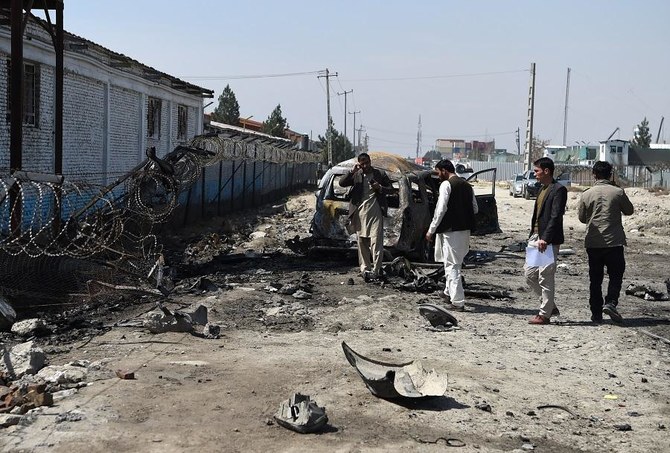
- The “Taliban don’t have any plans to carry out any such attacks,” spokesman Zabihullah Mujahed said
- Peace negotiations underway in Qatar, where the Taliban maintain a political office, are in the initial stages
Somalia detains US-trained commandos over theft of rations
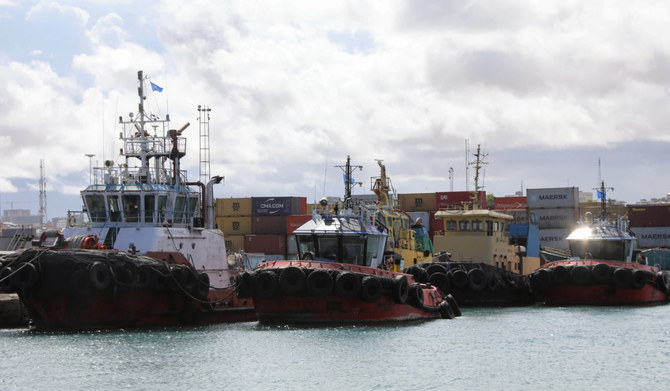
- The US agreed in 2017 to help train and equip the 3,000-strong Danab to act as a quick-reaction strike force against Al-Shabab
MOGADISHU: Somalia’s government said it had suspended and detained several members of an elite, US-trained commando unit for stealing rations donated by the US, adding that it was taking over responsibility for provisioning the force.
The Danab unit has been a key pillar of US-backed efforts to combat the Al-Qaeda-linked militant group Al-Shabab. The US agreed in February to spend more than $100 million to build up to five military bases for Danab.
Somalia’s Defense Ministry said in a statement that it had notified international partners of the theft and would share the outcome of its investigation.
A US official said in a statement to Reuters that Washington takes all corruption accusations seriously.
“We look forward to engaging with the Danab on creating the necessary safeguards and accountability measures to prevent future incidents that could affect future assistance,” the official said, without directly addressing whether any US support had already been suspended.
The US agreed in 2017 to help train and equip the 3,000-strong Danab to act as a quick-reaction strike force against Al-Shabab.
The group has been waging an insurgency against the central government since 2006.
Danab has been heavily involved in a military offensive by the Somali military and allied clan militias since 2022 that initially succeeded in wresting swaths of territory from Al-Shabab in
central Somalia.
However, the campaign has lost momentum, with the government-allied forces struggling to hold rural areas and Al-Shabab continuing to stage large-scale attacks, including in the capital Mogadishu.
Washington suspended some defense assistance to Somalia in 2017 after the military could not account for food and fuel.
The US also conducts frequent drone strikes targeting Al-Shabab militants.
Jewish campaign group led by Gideon Falter cancels London march over safety concerns

- The Campaign Against Antisemitism says safety concerns forced it to call off its “Walk Together” march after receiving threats from ‘hostile actors’
- Last weekend, a video appeared to show police prevent ‘openly Jewish’ Falter from walking near a pro-Palestine protest but a longer version of the footage painted a different picture
LONDON: The organizers of a march in protest against antisemitism, planned for Saturday in London, “reluctantly” announced on Friday that they were canceling the demonstration.
The Campaign Against Antisemitism said it was forced by safety concerns to call off its “Walk Together” march, which was scheduled to coincide with the latest in a series of pro-Palestine marches in the British capital. The organization said it had expected thousands of people to take part but threats from “hostile actors” posed a safety risk.
“We have received numerous threats and our monitoring has identified hostile actors who seem to have intended to come to any meeting locations that we announced,” the CAA said.
“The risk to the safety of those who wished to walk openly as Jews in London tomorrow as part of this initiative has therefore become too great.
“We are no less angry about these marches than our Jewish community and its allies. We want to walk.”
The group added that it wants the Metropolitan Police not only to “manage marches” but “police” them.
Last weekend, a video that circulated on social media sparked controversy as it showed a confrontation between the CAA’s chief executive, Gideon Falter, and a Metropolitan Police officer who appeared to be preventing him from crossing the road in the vicinity of a pro-Palestine march in London because he was “openly Jewish” and his presence was “antagonizing.”
Falter, who was threatened with arrest if he did not leave the area, criticized the police for their actions during the incident and claimed there were now “no-go zones for Jews” in London amid a rise in antisemitic sentiment arising from Israel’s war on Gaza following the Oct. 7 attacks by Hamas.
Police chiefs apologized twice for the officer’s choice of words. However, a former senior police officer said on Monday that the initial, short version of the video most people saw online “did not fully represent the situation.”
A longer version showed the officer expressing concern about Falter’s actions because he appeared to be deliberately attempting to provoke the pro-Palestinian demonstrators.
Berlin police clear pro-Palestinian camp from parliament lawn

- Police dismantled tents, forcibly removed protesters and blocked the surrounding area to stop others arriving
- "The idea was to draw attention to that and ... to the German complicity and active enabling of the Israeli genocide in Gaza," the camp organizer, Jara Nassar, said
BERLIN: Berlin police on Friday began clearing a pro-Palestinian camp set up in front of the German parliament by activists demanding the government stop arms exports to Israel and end what they say is the criminalization of the Palestinian solidarity movement.
Police dismantled tents, forcibly removed protesters and blocked the surrounding area to stop others arriving.
The action followed clashes between demonstrators and police on US campuses and a blockade at Paris’s Sciences Po university, part of international protests to decry Israel’s military campaign in Gaza and Western support for Israel.
The Berlin camp ‘Besetzung Gegen Besatzung’ — ‘Occupy Against Occupation’ — began on April 8, coinciding with the start of International Court of Justice hearings in Nicaragua’s case against Germany for providing military aid to Israel.
“The idea was to draw attention to that and ... to the German complicity and active enabling of the Israeli genocide in Gaza,” the camp organizer, Jara Nassar, told Reuters.
Israel strongly denies accusations that its offensive in Gaza, which aims to destroy the Palestinian militant group Hamas, constitutes a genocide.
Nassar and a dozen protesters sat on the ground, chanting pro-Palestinian slogans and songs as police with loudspeakers called on them to leave.
“We look at what is happening in the US ... with admiration. There is no reason to believe we should stop now,” said Udi Raz, a PhD student at Berlin’s Free University and a member of the Jewish Voice association.
Raz, who wore a Jewish kippah with the Palestinian flag colors and held his phone in a live social media broadcast of the clearance, said Jewish activists had joined the camp and held a candle-lit Passover dinner there this week.
Police said the prohibition order for the camp, which had been granted authorization at the start of the protest, was due to repeated violations committed by some protesters, including the use of unconstitutional symbols and forbidden slogans.
“Protection of gatherings cannot be guaranteed at this point because public safety and order are significantly at risk,” police spokesperson Anja Dierschkesaid said, adding tents had to be moved daily under local regulations to maintain the lawn.
“For the German government, grass matters more than the lives of more than 40,000 innocent people in Gaza murdered by the Israeli military,” Raz said.
Philippine police kill an Abu Sayyaf militant implicated in 15 beheadings and other atrocities
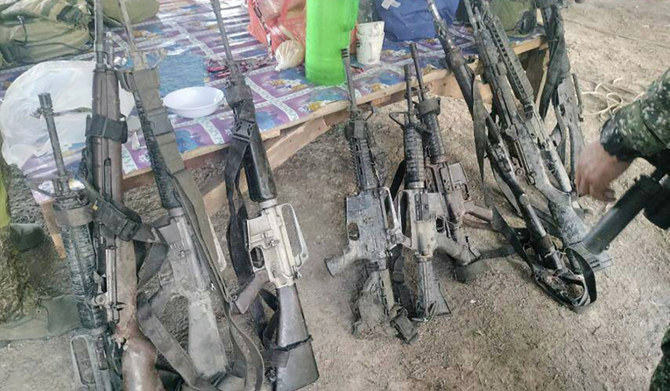
- A confidential police report said that Abdulsaid had been implicated in at least 15 beheadings in Basilan, including of 10 Philippine marines in Al-Barka town in 2007 and two of six kidnapped Vietnamese sailors near Sumisip town in 2016
MANILA: Philippine forces killed an Abu Sayyaf militant, who had been implicated in past beheadings, including of 10 Filipino marines and two kidnapped Vietnamese, in a clash in the south, police officials said Friday.
Philippine police, backed by military intelligence agents, killed Nawapi Abdulsaid in a brief gunbattle Wednesday night in the remote coastal town of Hadji Mohammad Ajul on Basilan island after weeks of surveillance, security officials said.
Abu Sayyaf is a small but violent armed Muslim group, which has been blacklisted by the US and the Philippines as a terrorist organization for ransom kidnappings, beheadings, bombings and other bloody attacks. It has been considerably weakened by battle setbacks, surrenders and infighting, but remains a security threat particularly in the southern Philippines, home to minority Muslims in the predominantly Roman Catholic nation.
Abdulsaid, who used the nom de guerre Khatan, was one of several Abu Sayyaf militants who aligned themselves with the Daesh group.
A confidential police report said that Abdulsaid had been implicated in at least 15 beheadings in Basilan, including of 10 Philippine marines in Al-Barka town in 2007 and two of six kidnapped Vietnamese sailors near Sumisip town in 2016. The Vietnamese were seized from a passing cargo ship.
He was also involved in attacks against government forces in 2022 and a bombing in November that killed two pro-government militiamen and wounded two others in Basilan, the report said.
Abdulsaid was placed under surveillance in February, but police forces couldn’t immediately move to make a arrest because of the “hostile nature” of the area where he was eventually gunned down, according to the report.
On Monday, Philippine troops killed the leader of another Muslim rebel group and 11 of his men blamed for past bombings and extortion in a separate clash in a marshy hinterland in Datu Saudi Ampatuan town in southern Maguindanao del Sur province, the military said.
Seven soldiers were wounded in the clash with the members of the Bangsamoro Islamic Freedom Fighters.
The Abu Sayyaf and the Bangsamoro Islamic Freedom Fighters are among a few small armed groups still struggling to wage a separatist uprising in the southern Philippines.
The largest armed separatist group, the Moro Islamic Liberation Front, signed a 2014 peace pact with the government that eased decades of sporadic fighting.
Moro Islamic Liberation Front rebel commanders became parliamentarians and administrators of a five-province Muslim autonomous region in a transition arrangement after signing the peace deal. They are preparing for a regular election scheduled for next year.
Saudi Pavilion at Expo 2025 Osaka: A journey through Saudi Arabia’s transformation, Vision for Future
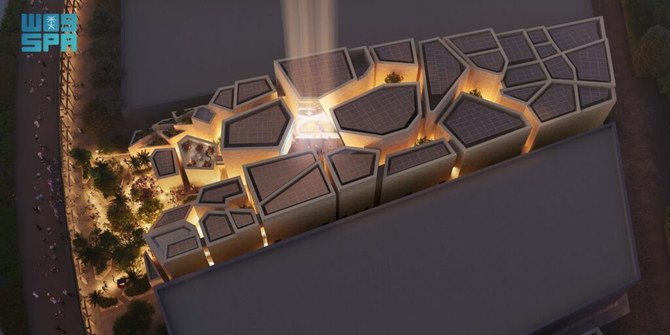
- Saudi chefs will present a mix of flavours inspired by different regions of the Kingdom
- More than 200 selections of souvenirs will be displayed in the gift shop, each a testament to authentic Saudi craftsmanship
OSAKA: The Saudi pavilion participating in Expo 2025 Osaka in Japan has announced an unprecedented cultural and artistic program encompassing more than 700 events to introduce visitors to Saudi Arabia’s rich heritage, mega projects and various economic opportunities.
The Saudi pavilion at the expo will present Saudi Arabia’s past, transformational journey and vision for a sustainable and prosperous future. It will include a wide range of performances, such as traditional arts, classical music and fashion shows.
Saudi chefs will present a mix of flavours inspired by different regions of the Kingdom, and Saudi musicians and artists will perform daily to highlight the Kingdom’s rich cultural heritage.
A dedicated area for prominent figures will host various sessions and display a series of presentations to inform companies and investors of all the economic opportunities available in the Kingdom.
More than 200 selections of souvenirs will be displayed in the gift shop, each a testament to authentic Saudi craftsmanship.
Visitors from around the world will learn about AlUla City, located in north-west Saudi Arabia, which is home to dramatic desert landscapes, spectacular rock formations and some of the Middle East’s most significant ancient sites.
Major Saudi projects will be highlighted, including NEOM, the land of the future; THE LINE, the 170-kilometer-long city that will be the future of urban living; Oxagon, which is redefining the traditional industrial model; and Trojena, the mountain resort of NEOM.
The pavilion will also showcase aspects of ‘Green Riyadh,’ a revolutionary project that aims to transform Saudi Arabia’s capital into a green oasis by planting 7.5 million trees by 2030. This project aims to place Riyadh as one of the world’s top 100 most livable cities.
It will also highlight the Reefscape Restoration Initiative, launched by the King Abdullah University of Science and Technology (KAUST). This initiative seeks to conserve, enhance, and restore 100 hectares of coral reefscape in the Red Sea and design and build the world’s largest Coral Nursery at Jeddah beach, with an expected coral production of 400k per year.
General Commissioner of the Saudi Pavilion Othman Al-Mazyad said: “We look forward to enabling visitors of the Saudi pavilion to learn about the Kingdom, its traditions, journey of transformation and vision for a sustainable future.”
Relations between Saudi Arabia and Japan have been continuously growing, thanks to the Saudi-Japanese Vision 2030. The Saudi Pavilion at Expo 2025 Osaka will allow companies and investors from Japan and worldwide to learn about the Kingdom’s various opportunities, aiming to forge new partnerships and expand existing agreements.



